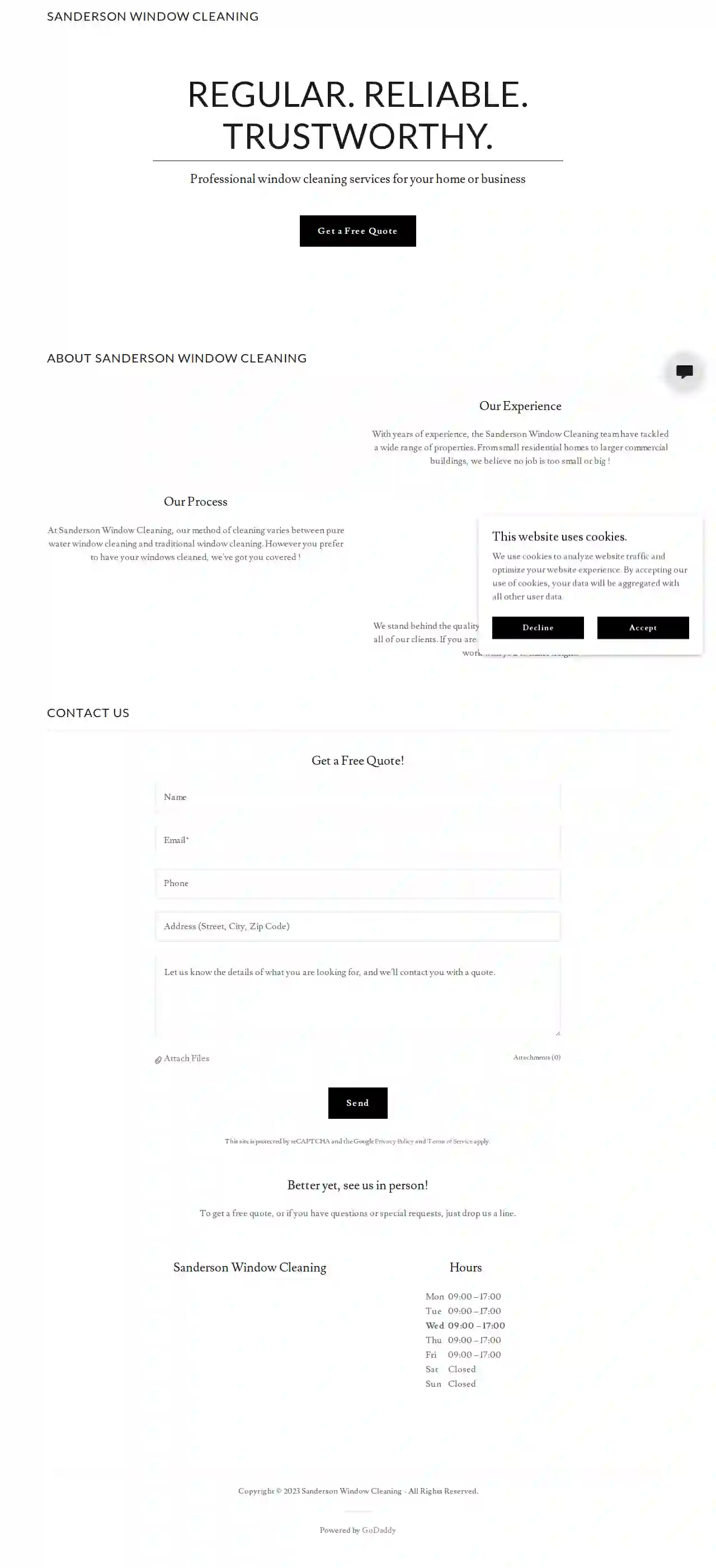Window Cleaning Westgate on Sea
Find the best Commercial Window Cleaning in Westgate on Sea
Receive up to 3 Commercial Window Cleaning quotes for your project today! Compare profiles, reviews, accreditations, portfolio, etc... and choose the best deal.

Berry Bright Window Cleaning
53 reviewsNA, GBBerry Bright is a family-owned and operated professional window cleaning company serving Cardiff and its surrounding areas. We pride ourselves on delivering high-quality, professional window cleaning services with exceptional attention to detail. Our team is courteous, clean, efficient, and committed to providing a safe work environment and peace of mind to our clients. We utilize a 70ft reach and wash system, allowing us to clean up to 7 storeys from the ground. Our chemical-free cleaning process employs ultra-pure deionised water, ensuring a spotless finish. We offer a range of exterior cleaning services, including traditional and modern methods, to meet your specific needs. We are dedicated to sustainability and caring for the environment, reflected in our industry-recognized professional accreditations and investment in the best equipment. Our £10-million general & public liability insurance policy provides you with complete peace of mind. With over 10 years of experience, Berry Bright is a name you can trust for all your window and exterior cleaning requirements.
- Services
- Why Us?
- Accreditations
- Our Team
- Testimonials
- Gallery
Get Quote
Elite Cleaning Services
Herne Bay, Kent, 23 Upper Free Down, CT6 7DG, GBEstablished since 1972, Elite Cleaning Services has built an impeccable reputation for thoroughness and attention to detail. As a result of over 40 years of experience in the industry, we have a client list that includes many local schools, housing associations, local government offices, retail outlets, construction companies and various businesses. We offer a wide range of commercial cleaning services, including commercial cleaning, anti-viral fogging service, office cleaning, window cleaning, carpet and upholstery cleaning, property cleaning, floor cleaning, cladding cleaning, warehouse cleaning, and sheltered housing. Our team of experts is dedicated to providing a personalized commercial cleaning service that meets the unique needs of each client.
- Services
- Why Us?
- Testimonials
- Gallery
Get Quote
APT Window Cleaning
544 reviewsDeal, GBAPT Window Cleaning is a commercial window cleaning company with over 20 years of experience. They are dedicated to providing high quality, efficient, and effective window cleaning services across the UK. APT Window Cleaning uses the best equipment, ensuring they can clean windows up to a height of 65 feet (6 stories) from the safety of the ground. They offer both traditional and modern window cleaning techniques, including internal window cleaning. APT Window Cleaning is committed to excellence in every step of the process, from the first contact to the final result. They are a reliable, excellent, and competitively priced window cleaning company. Their exclusive focus on commercial window cleaning allows them to continuously improve and strive for perfection. APT Window Cleaning offers a range of services, including regular services, one-off cleans, out-of-hours, weekend, and bank holiday options. They cater to all commercial needs, such as schools, estates, contract cleaning, councils, government buildings, office blocks, distribution centres, hospitals, retirement blocks, care homes, colleges, universities, residential blocks, apartment blocks, supermarkets, hotels, leisure centres, golf clubs, and shopping centres. APT Window Cleaning uses water fed pole cleaning systems for external window cleaning, employing the latest water purification technology. Their water fed pole van mounted systems deliver 100% pure water, eliminating the need for harsh cleaning detergents and ensuring an environmentally friendly solution. They also own the best trolley water fed pole systems, adding an extra layer of flexibility to their services. These systems can be safely and easily moved around a site, making them perfect for cleaning windows in awkward spaces. APT Window Cleaning is dedicated to incorporating advanced technology and methods to ensure efficient, environmentally friendly, and high-quality window cleaning at competitive costs. They guarantee exceptional service tailored to your needs. When you choose APT Window Cleaning, you can expect a meticulous window cleaning process that removes dirt, dust, grime, and any other debris, leaving your windows with a flawless, streak-free finish. They use specialised tools to reach even the most challenging windows and adhere to stringent safety standards, maintaining an accident-free record. They offer regular maintenance programs and use eco-friendly cleaning solutions and methods. APT Window Cleaning is fully insured for your peace of mind. APT Window Cleaning offers a transparent quotation process. They will schedule a site visit to assess your property and provide an accurate cost.
- Services
- Why Us?
- Accreditations
- Gallery
Get Quote
L.P.C Window Cleaning
53 reviews3 Southwood Close, Christchurch, BH23 5RW, GBL.P.C Window Cleaning is a south coast based window cleaning company dedicated to customer satisfaction. We utilize the latest water fed pole system for efficient cleaning, while also accommodating those who prefer traditional methods. Our services cater to both domestic and commercial properties, delivering outstanding results.
- Services
- Why Us?
- Testimonials
- Gallery
Get Quote
CCS Services Window & Gutter Cleaning Cardiff
51 reviewsRhoose, Vale of Glamorgan, 9 Maes Slowes Leyes, CF62 3LT, GBCOMMERCIAL CLEANING CARDIFF & SOUTH WALES Get a free quote WHO WE ARE CCS Services is the preferred and approved professional commercial cleaning contractors for councils, offices, property management, facilities companies and local residents. We cover a broad spectrum of janitorial and cleaning services for both domestic and commercial customers. The company prides itself on its established reputation in being at the forefront of the cleaning industry, coupled with continued investment into staff training, equipment and expertise. Using Green & Eco Friendly Cleaning wherever we can. Health and Safety considerations are at the heart of all our operations as we are committed to optimum standards of safety and corporate responsibility. The team utilises the latest cleaning methods and solutions. Purified water is used in our window cleaning work. Airflex Storm portable truck mount machines are used for our carpet cleaning. The latest gutter vac system carries out the ultimate gutter cleaning service. We also have exclusive access to a spider lift R160 which we use for high level access cleaning both indoors and outdoors. Having access at all heights also complements our render cleaning where we utilise the latest soft washing techniques which is not only safer but superior to traditional power or pressure washing.
- Services
- Why Us?
- Testimonials
- Gallery
Get Quote
Kevin Blackburn Window Cleaning Service
51 reviews93 Widmore Drive, Hemel Hempstead, HP2 5ND, GBKevin Blackburn Window Cleaning is a professional window cleaning service based in Hemel Hempstead. We provide a range of services including domestic window cleaning, commercial window cleaning, solar panel cleaning, gutter clearance, and high-access window cleaning. Our team of experts uses the latest technology and equipment to ensure a safe and streak-free cleaning experience. We cater to all types of properties, including offices, schools, factories, warehouses, and homes. Contact us today to get a free quote and experience the best window cleaning in Hemel Hempstead.
- Services
- Why Us?
- Gallery
Get Quote
Mighty Cleaning Services Ltd
4.515 reviewsSpringhead Enterprise Park, Springhead Road, Suite 2007, Fleet House, Northfleet, DA118HJ, GBMighty Cleaning Services is a professional exterior cleaning company dedicated to making your home look its best. We offer a wide range of services, including window cleaning, gutter clearance, solar panel cleaning, fascia, soffit, and weatherboard cleaning, pressure washing, and conservatory cleaning. We use the latest technology and techniques to ensure a high-quality clean every time. Our team is fully trained and insured, and we are committed to providing excellent customer service. We serve customers in SE London and Kent.
- Services
- Why Us?
- Gallery
Get Quote
Minster Cleaning
4.210 reviewsMinster, GBProviding reliable, quality cleaning to over 5,000 UK businesses. We’ve built a reputation for outstanding office and commercial cleaning in Cardiff and surrounding areas. Here are the things that set our service apart: Reliability – we understand you need us to be there when we say we will be. That’s why we are as careful about managing absence cover as we are about our cleaning. Support – our cleaners are supported by dedicated field and office teams, giving you peace of mind that the management of your cleaning is in safe hands. Consistency – our processes for monitoring standards ensure your cleaning is done to the same exacting detail every time we visit. Trust – our rigorous recruitment policies include, where applicable, additional security checks for safeguarding your people, processes and premises. We also think being friendly and great value is a combination you will appreciate!
- Services
- Why Us?
- Gallery
Get Quote
Sanderson Window Cleaning
51 reviews100 Main Street, Westborough, 01776, GBSanderson Window Cleaning is a professional window cleaning service dedicated to providing reliable and trustworthy service for both residential and commercial properties. With years of experience, our team has tackled a wide range of projects, from small homes to large buildings. We understand that every client has unique needs, which is why we offer both pure water window cleaning and traditional methods to ensure the best possible results. At Sanderson Window Cleaning, we stand behind the quality of our work and offer a satisfaction guarantee. If you're not completely happy with our services, we'll work with you to make it right. Contact us today for a free quote or to discuss your window cleaning needs. We're happy to answer any questions you may have.
- Services
- Why Us?
- Gallery
Get Quote
Ethicleen
4.36 reviewsGBBased in Sevenoaks, Ethicleen offers regular window cleaning, gutter cleaning and other external cleaning services. We serve residential and commercial customers throughout the West Kent and East Surrey areas. Ethicleen specialise in high reach pure water fed pole window cleaning and use state of the art gutter vacs. A water fed pole uses an ultralight monofilament brush to dislodge dirt on the window frames and glass before rinsing with purified water. This way ensures that all of the hard to reach areas are fully cleaned and that the windows are left streak free. Using this method also guarantees the safety of our staff as all of the work is completed without the use of ladders.
- Services
- Why Us?
- Testimonials
- Gallery
Get Quote
Over 35,055+ Janitorial Services registered
Our cleaning pros operate in Westgate on Sea & beyond!
CleaningMatch has curated and vetted Top Cleaning Businesses in Westgate on Sea. Find a trustworthy contractor today.
Frequently Asked Questions About Window Cleaning
- Ask Directly: When requesting quotes or contacting the company, ask directly if they have liability insurance and workers' compensation insurance.
- Check Their Website: Many reputable window cleaning companies will prominently display their insurance information on their website.
- Request Proof of Insurance: Don't hesitate to request a copy of their insurance certificate for verification. This document outlines their coverage and policy details.
- Using Paper Towels: Paper towels can leave lint and streaks on windows. Use microfiber cloths instead.
- Cleaning in Direct Sunlight: The cleaning solution dries too quickly, leading to streaks. Clean on a cloudy day or in the shade.
- Not Cleaning the Frames: Dirty window frames can make even clean glass look dingy. Wipe down the frames as part of your cleaning routine.
- Using Harsh Chemicals: Harsh chemicals can damage window seals and etch the glass. Opt for milder cleaning solutions like vinegar or commercial glass cleaners.
- Not Rinsing Thoroughly: Residual cleaning solution can attract dirt and cause streaks. Rinse windows thoroughly with clean water.
- Inspect Thoroughly: Check all windows carefully to identify any issues, such as streaks, missed spots, or damage.
- Document the Problems: Take photos or videos of any unsatisfactory areas to provide evidence.
- Contact the Company: Contact the window cleaning company immediately and politely explain the issues. Provide the documentation you gathered.
- Request a Redo: Ask the company to redo the cleaning in the unsatisfactory areas. Most reputable companies offer a satisfaction guarantee and will be willing to address your concerns.
- Leave a Review: If the company is unwilling to resolve the issues, consider leaving an honest review online to inform other potential customers.
Do window cleaners clean window screens?
Professional screen cleaning typically involves removing the screens, gently washing them with a cleaning solution, rinsing, and allowing them to dry thoroughly before reinstalling. This process removes dirt, allergens, and other particles, improving both the appearance and functionality of your screens.
How can I tell if a window cleaning company is insured?
A reputable and responsible window cleaning company will be transparent about their insurance coverage, providing peace of mind for their clients.
What are some common window cleaning mistakes to avoid?
By avoiding these mistakes, you can improve your window cleaning technique and achieve more satisfactory results.
What should I do if my window cleaner doesn't do a good job?
Clear communication, documentation, and a willingness to work towards a resolution can help address unsatisfactory window cleaning results.
Do window cleaners clean window screens?
Professional screen cleaning typically involves removing the screens, gently washing them with a cleaning solution, rinsing, and allowing them to dry thoroughly before reinstalling. This process removes dirt, allergens, and other particles, improving both the appearance and functionality of your screens.
How can I tell if a window cleaning company is insured?
- Ask Directly: When requesting quotes or contacting the company, ask directly if they have liability insurance and workers' compensation insurance.
- Check Their Website: Many reputable window cleaning companies will prominently display their insurance information on their website.
- Request Proof of Insurance: Don't hesitate to request a copy of their insurance certificate for verification. This document outlines their coverage and policy details.
A reputable and responsible window cleaning company will be transparent about their insurance coverage, providing peace of mind for their clients.
What are some common window cleaning mistakes to avoid?
- Using Paper Towels: Paper towels can leave lint and streaks on windows. Use microfiber cloths instead.
- Cleaning in Direct Sunlight: The cleaning solution dries too quickly, leading to streaks. Clean on a cloudy day or in the shade.
- Not Cleaning the Frames: Dirty window frames can make even clean glass look dingy. Wipe down the frames as part of your cleaning routine.
- Using Harsh Chemicals: Harsh chemicals can damage window seals and etch the glass. Opt for milder cleaning solutions like vinegar or commercial glass cleaners.
- Not Rinsing Thoroughly: Residual cleaning solution can attract dirt and cause streaks. Rinse windows thoroughly with clean water.
By avoiding these mistakes, you can improve your window cleaning technique and achieve more satisfactory results.
What should I do if my window cleaner doesn't do a good job?
- Inspect Thoroughly: Check all windows carefully to identify any issues, such as streaks, missed spots, or damage.
- Document the Problems: Take photos or videos of any unsatisfactory areas to provide evidence.
- Contact the Company: Contact the window cleaning company immediately and politely explain the issues. Provide the documentation you gathered.
- Request a Redo: Ask the company to redo the cleaning in the unsatisfactory areas. Most reputable companies offer a satisfaction guarantee and will be willing to address your concerns.
- Leave a Review: If the company is unwilling to resolve the issues, consider leaving an honest review online to inform other potential customers.
Clear communication, documentation, and a willingness to work towards a resolution can help address unsatisfactory window cleaning results.